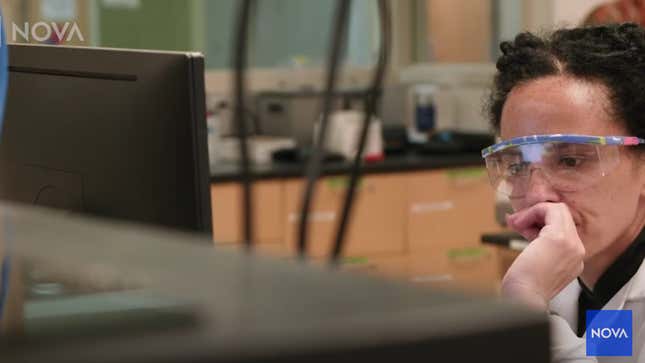
As many Black folks have learned climbing the figurative ladder of success, “Black excellence” does not provide immunity from racism. In fact, the various micro-aggressions become quite acute when cloaked with the veil of excellence.
In PBS NOVA’s film Picture a Scientist, directed by Sharon Shattuck and Ian Cheney, which takes an investigative approach to gender bias and racism on a systemic level within the science filed.
More info about the upcoming feature film, via the official press release sent to The Root:
The film explores these broader institutional issues through the personal stories of three women who have been subject to gender bias in their careers, ranging from years of subtle slights to outright harassment. Viewers first meet Jane Willenbring, Ph.D., a geomorphologist whose once-in-a-lifetime opportunity to do field work in Antarctica becomes one of the darkest moments in her life. Then, Nancy Hopkins, Ph.D., a molecular biologist, shares the many instances of bias that held her back throughout her career, which ultimately led her and several female colleagues at the Massachusetts Institute of Technology to form a committee to investigate inequalities at the institution. Finally, Raychelle Burks, Ph.D., an analytical chemist, who has had to endure consistent, subtle slights, such as being mistaken for a custodian and being ignored in meetings, shares her perspective on the many challenges she has faced as an African American woman in the field.
The film also goes beyond laying out specific instances of harassment and takes viewers through perspectives and studies from social scientists, neuroscientists, and psychologists to explain the gender bias phenomenon and why it continues to be so prevalent today. The film shows a social experiment that asked participants within the scientific community to evaluate resumes of two fictional scientists whose profiles differed only in gender. The female student was rated as inferior to the male student on every professional dimension that they assessed.
“This is a film about the troubling workplace culture many women have experienced in scientific institutions and the damage this causes, not only to individual women, but to science as a whole,” NOVA Co-Executive Producer Julia Cort said in a statement. “We are thrilled to be able to offer audiences such an intimate window into the challenges and revelations of each of these stories, and we hope they’ll lead us all to imagine a better future for the culture of science.”
Given our primary demographic at The Root, we must acknowledge that Cort’s statement is wrapped in layers and intersections when you’re a Black woman working within these institutions. There is already a general racial inequity displayed across the board, including biases within the National Institutes of Health when it comes to research fund grant access, as The Root reported back in 2011.
As such, The Root has obtained an exclusive clip focusing on Dr. Burks and her particular experiences.
As the above clip notes, the representation is abysmal—with 2.2% of Black women obtaining Ph.D’s in STEM fields in the U.S. in 2016, compared to 47.9% white men and 25.7% white women.
“There a lots of things I love about sciences, academia and my job. But, there’s also some real bullshit,” Dr. Burks states, succinctly.
“One thing we keep coming back to is this irony that many scientists believe that science can be free of bias,” Shattuck said in a statement. “However, as found in the film this is not the case and these biases persist today. Our hope is to enlighten viewers on these complex systemic issues, past what only may be visible on the surface.”
“In academia, as women of color, you’re going to have different types of abuse from different people,” Dr. Burks added. “I remember when I was in my office once, sitting at my desk, at my computer—I had papers spread out—someone comes into my office and for some reason assumes I’m the janitor.”
I think we can all surmise what that “reason” is. Of course, there is nothing inherently shameful about custodial work, though the stereotypical assumption typically implies such, which presents an array of issues. Dr. Burks also goes on to recount another example of her voice being diminished and erased when she presents a suggestion that is later taken seriously when a white man says the same thing.
Picture a Scientist premieres Wednesday, April 14 at 9 p.m. ET on PBS. The film will also be available for streaming online at pbs.org/nova and via the PBS video app. Immediately following the broadcast of Picture a Scientist, PBS will also premiere a short documentary film called Search Engine Breakdown which follows “two preeminent Black women researchers, Safiya Noble, Ph.D. and LaTanya Sweeney, Ph.D., present compelling evidence of the need for inclusivity and equity in the fields of computer science and technology, as they uncover the damaging biases at work in the search engines we rely on every day.”

